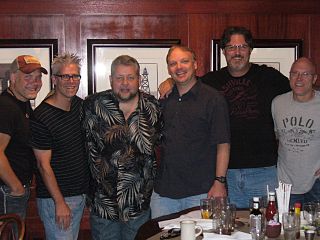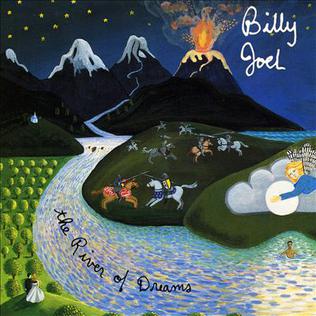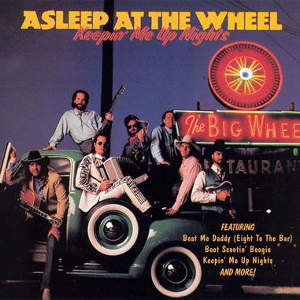Related Research Articles

"Gentle on My Mind" is a song that was written and originally recorded by John Hartford, and released on his second studio album, Earthwords & Music (1967). Hartford wrote the song after watching Doctor Zhivago in 1966, as he was inspired by the film and his own personal experiences. The lyrics describe the reminiscences of lost love of a man as he travels through the country. An obituary for Hartford indicated that the lyrics are "about a hobo reminiscing about a lost love". The following year, Hartford released the song as a single on RCA Records.

Pamela Yvonne Tillis is an American country music singer, songwriter, record producer, and actress. She is the eldest child of country singer Mel Tillis. After recording unsuccessful pop material for Elektra and Warner Records in the early 1980s, Tillis shifted to country music. In 1989, she signed with Arista Nashville, entering top-40 on Hot Country Songs for the first time with "Don't Tell Me What to Do" in 1990. This was the first of five singles from her breakthrough album Put Yourself in My Place.
This is a list of notable events in country music that took place in the year 1995.

Noble Ray Price was an American country music singer, songwriter, and guitarist. His wide-ranging baritone is regarded as among the best male voices of country music, and his innovations, such as propelling the country beat from 2/4 to 4/4, known as the "Ray Price beat", helped make country music more popular.

The Highwaymen was an American country music supergroup, composed of four of country music's biggest artists who pioneered the outlaw country subgenre: Johnny Cash, Waylon Jennings, Willie Nelson, and Kris Kristofferson. Between 1985 and 1995, the group recorded three major label albums as The Highwaymen: two on Columbia Records and one for Liberty Records. Their Columbia works produced three chart singles, including the number one "Highwayman" in 1985.

Mark Nelson Chesnutt is an American country music singer and songwriter. Between 1990 and 1999, he had his greatest chart success recording for Universal Music Group Nashville's MCA and Decca branches, with a total of eight albums between those two labels. During this timespan, Chesnutt also charted twenty top-ten hits on the Billboard Hot Country Songs charts, of which eight reached number one: "Brother Jukebox", "I'll Think of Something", "It Sure Is Monday", "Almost Goodbye", "I Just Wanted You to Know", "Gonna Get a Life", "It's a Little Too Late", and a cover of Aerosmith's "I Don't Want to Miss a Thing". His first three albums for MCA along with a 1996 Greatest Hits package issued on Decca are all certified platinum by the Recording Industry Association of America (RIAA); 1994's What a Way to Live, also issued on Decca, is certified gold. After a self-titled album in 2002 on Columbia Records, Chesnutt has continued to record predominantly on independent labels.

Maverick is the sixth studio album by the American blues rock band George Thorogood and the Destroyers. It was released on January 25, 1985 by the label EMI America Records. Some of its songs are among Thorogood's best-known, including "I Drink Alone" and "Willie and the Hand Jive". The album peaked at No. 32 on the Billboard 200 chart.

Western Flyer was an American country music band founded in 1992 by Danny Myrick, Chris Marion, T. J. Klay, Bruce Gust, Steve Charles, and Roger Helton. The band released two albums for Step One Records, as well as six singles. Their highest peaking single is "What Will You Do with M-E?", which reached No. 32 on the Billboard country charts in 1996. After Western Flyer disbanded, Marion joined the Little River Band, and Myrick began writing songs for other artists.

"The River of Dreams" is a song by American musician Billy Joel. It is the title track and first single from his twelfth album, River of Dreams (1993). It was released in July 1993 by Columbia Records and became a hit, peaking at number three on the US and UK charts, making it Joel's best-charting single of the decade as well as his final top ten in either country to date. It also hit the top spot in Australia, New Zealand, and on the Canadian and US Adult Contemporary charts. The song was produced by Joe Nicolo and Danny Kortchmar. Its accompanying music video was directed by Andy Morahan and filmed in Connecticut, the US.
"The Last Thing on My Mind" is a song written by American musician and singer-songwriter Tom Paxton in the early 1960s and recorded first by Paxton in 1964. It is based on the traditional lament song "The Leaving of Liverpool". The song was released on Paxton's 1964 album Ramblin' Boy, which was his first album released on Elektra Records.

"International Harvester" is a song written by Jeffrey Steele, Shane Minor and Danny Myrick, and recorded by American country music singer Craig Morgan. It was released in September 2007 as the third single from his album Little Bit of Life, released in 2006 on Broken Bow Records.
"If the Devil Danced " is a song written by Ken Spooner and Kim Williams, and recorded by American country music singer Joe Diffie. The song reached the top of the Billboard Hot Country Singles & Tracks chart. It was released in April 1991 as the third single from his debut album, A Thousand Winding Roads.
"Ships That Don't Come In" is a song recorded by American country music singer Joe Diffie that reached the Top 5 on the Billboard Hot Country Singles & Tracks chart in 1992. It was released in April 1992 as the second single from his album Regular Joe. The song was written by Julian Williams, Paul Nelson and Dave Gibson the latter of whom was also recording for Epic as a member of the Gibson/Miller Band at the time.
Step One Records was an independent American record label established in February 1984 in Nashville, Tennessee. The label was founded by singer-songwriter and producer Ray Pennington with Curtis Potter, the former of whom had produced for Waylon Jennings. At the time of the label's foundation, it was one of the few independent country music labels to have significant chart success, most notably in 1991, when the label released Clinton Gregory's "(If It Weren't for Country Music) I'd Go Crazy", the only independently released single on the Billboard country charts at the time of its release. The label lasted into the mid 1990s, having more visibility with Western Flyer's "Cherokee Highway" and "What Will You Do With M-E?". Other artists signed to the label included Ashley Evans, The Geezinslaws, Ray Price, Faron Young, and Pennington himself. The label closed in 1998 and the catalog is owned by Gusto Music.

"How Far Do You Wanna Go?" is a song recorded by American country music group Gloriana, written by Danny Myrick, Jeffrey Steele and Matt Serletic. It was released in September 2009 as the second single from the band's self-titled debut album.

"Always and Forever" is an R&B song written by Rod Temperton and produced by Barry Blue. It was first recorded by the British-based multinational funk-disco band Heatwave in 1976. Released as a single on 3 December 1977, the song is included on Heatwave's debut album Too Hot to Handle (1976) and has been covered by numerous artists, becoming something of a standard.

The following is a detailed discography of all albums released by country music singer Willie Nelson, since his professional debut in 1962. Nelson's discography includes 101 studio albums, 14 live albums, 51 compilation albums and 41 video albums as well as the soundtracks of The Electric Horseman and Honeysuckle Rose. According to Courier Journal, Nelson's 2024 album The Border was his 152nd album.

Keepin' Me Up Nights is the 11th studio album by American western swing band Asleep at the Wheel. Recorded primarily in Nashville, Tennessee, it was produced by the band's frontman Ray Benson with Barry Beckett, Tim DuBois and Scott Hendricks, and released in July 1990 as the group's first album on Arista Records. Unlike its 1988 predecessor Western Standard Time, Keepin' Me Up Nights features almost all original material, with just one cover version included.

Tribute to the Music of Bob Wills and the Texas Playboys is the 12th studio album and first tribute album by American country band Asleep at the Wheel. Recorded at studios in Austin, Texas, and Nashville, Tennessee, it was produced by the band's frontman Ray Benson and released on October 25, 1993, by Liberty Records. The collection features recordings of songs made popular by Western swing group Bob Wills and His Texas Playboys, a major influence on Asleep at the Wheel.
Patsy Ann Bruce was an American country-western songwriter, music artist manager, and casting agent and businesswoman. She is best known for songs co-written with her then-husband, singer Ed Bruce, during the late 1970s and early 1980s, including the country-western standard "Mammas Don't Let Your Babies Grow Up to Be Cowboys," which was recorded by Waylon Jennings with Willie Nelson and went to No. 1 on the country chart in 1978.
References
- 1 2 3 4 5 Tom Roland (January 17, 1995). "Western Flyer sends a message". The Tennessean. pp. 1D. Retrieved February 1, 2022.
- 1 2 3 4 5 "Country song dares to tackle racism head-on". Deseret News . February 18, 1995. Archived from the original on September 23, 2015. Retrieved 2008-08-04.
- 1 2 3 4 Van Rose (October 3, 1994). "For band Western Flyer, no road's too rough, no song's too tough". The Times Leader. pp. 1C, 2C. Retrieved January 18, 2022.
- ↑ "New releases" (PDF). Gavin Report: 14. March 25, 1995.
- 1 2 "Top 100 Country Singles" (PDF). Cashbox: 22. May 6, 1995.
- ↑ "Country" (PDF). RPM: 11. April 24, 1995.
- ↑ "Country" (PDF). RPM: 11, 12. May 8, 1995.
- 1 2 "Country Tracks" (PDF). RPM: 16. July 17, 1995.